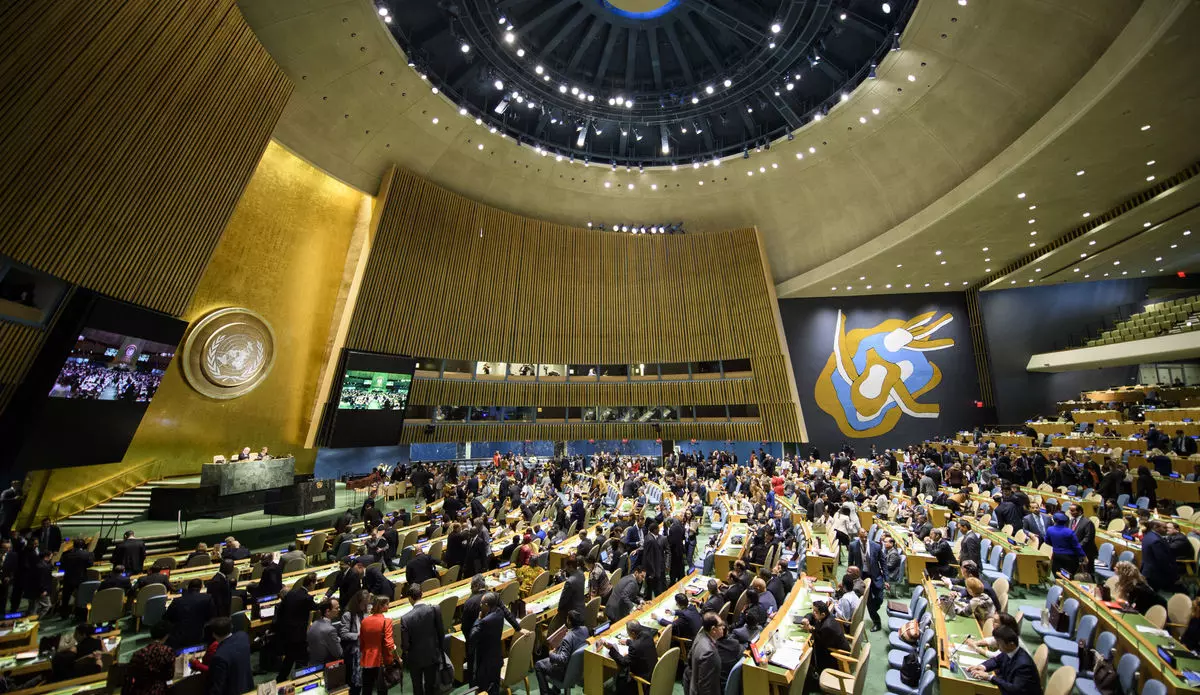
The helplessness of the UN
text_fieldsIsrael's challenge to the world could not be more evident. It would take no slight arrogance to come to the world stage where negotiations are to be held to end conflicts and bring peace, to come to the United Nations General Assembly, break all etiquette and law and blow the war trumpet, obliquely calling for an attack on Lebanon's Hezbollah and its leaders. Within an hour, the Israeli army intensified its airstrikes on the capital of the sovereign state of Lebanon. And then Israel drops 80 high-powered bombs on the city of Beirut. Six civilian residential complexes allegedly used as Hezbollah headquarters are demolished. As Netanyahu, the prime minister of a country already known for obvious war crimes, sat in the UN General Assembly and spread the war, the world could only watch helplessly.
What was seen the other day at the UN was the sharpest metaphor of this global 'helplessness' of seven decades, and particularly of the last 12 months. Israel, which defies international bodies and laws, and the major powers that support it, are responsible for this situation, which can be dangerous for even themselves. It was only ten days ago that the United Nations General Assembly passed a resolution with an overwhelming majority. It required Israel to withdraw from the occupied Palestinian territories within one year. Only 14 countries opposed the resolution. Among the 124 countries that supported it were some that had previously strongly supported Israel. (Sadly, India was among the 43 countries that abstained from voting!).
Although the General Assembly's resolution stopped short of reprimanding, it criticized Israel in the strongest terms ever. This resolution also came in the context of increased powers available to Palestine in the UN. Israel, as usual, ignored the resolution which reflected the sentiments of the overwhelming majority of the world's population. Since Israel has defied about 40 Security Council resolutions that member states are legally obligated to comply with, no matter how fierce the resolution of the General Assembly, this resolution which is not legally binding is far from being a bother for that country. But it is comforting to realize that the will of the world has turned against Israel. Some regimes now also understand that condoning the execution of Hamas leader Ismail Haniyeh, former Iranian President Ebrahim Raisi, and now Hasan Nasrallah amount to rejecting most of the rulings that are accepted the world over.
Beyond the drama and jubilation of victory, the rogue state and its criminal leadership have now been made the culprits before the world. In the ongoing UN General Assembly, many countries have criticized Israel in harsh language, among them South Africa, Chile, Senegal, Honduras, Venezuela, Namibia, Barbados and Slovenia. As Netanyahu began to address the General Assembly, representatives of the world's nations rose up en masse in protest. It is also a paradox that it is not the General Assembly with its global representation, but the Security Council, with a few 'powerful' nations wielding unfair powers including the veto, that has legal force. An outdated and neutralised United Nations structure is not only incapable of solving problems, but is also forced to be complicit in injustice. America shields Israel's crimes; the UN is forced to offer a shield for the crimes of the great powers. In Palestine, Lebanon, Sudan, Ukraine, Myanmar, Haiti and many other places, the UN is not even able to ease the conflict when people are dying.
One way is for countries that do not agree with the injustice of the big powers to make their own decisions and chart their own course forward. At any rate, there should be some way out of the current miserable state of affairs, by increasing the efficiency of institutions like the World Court and the World Criminal Court, by giving permanent membership to more countries in the Security Council thereby making it more representative, and by removing the veto power - at least the provision of the veto of a single country overriding the super-majority.

























